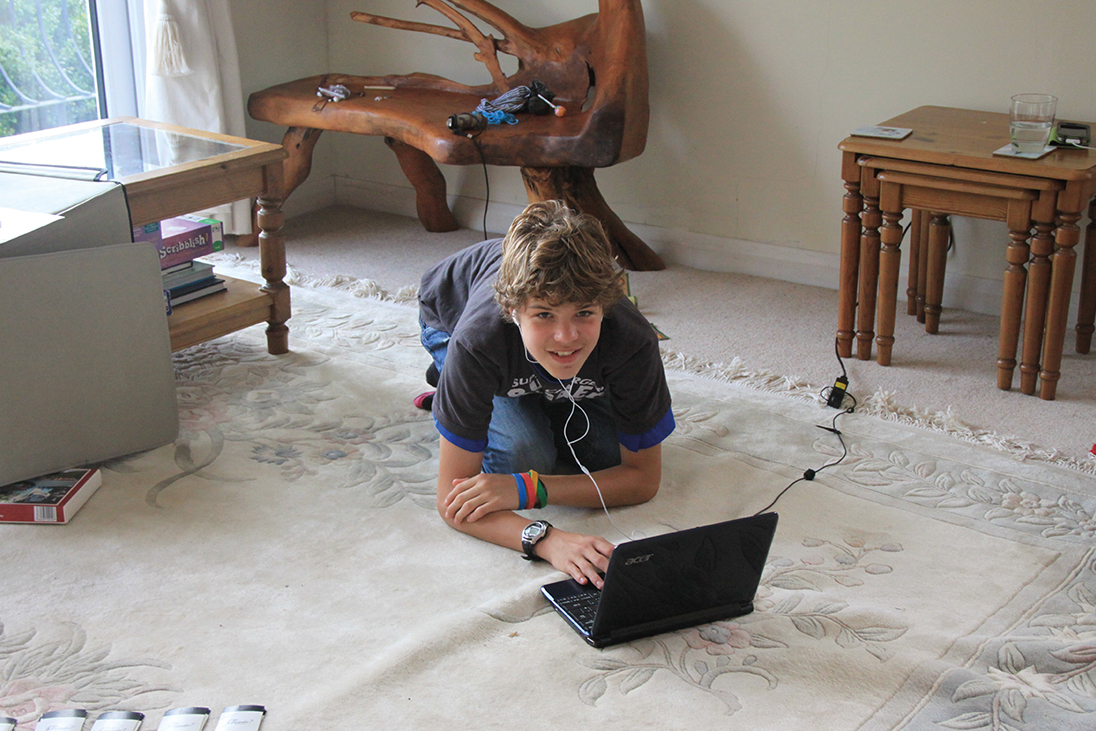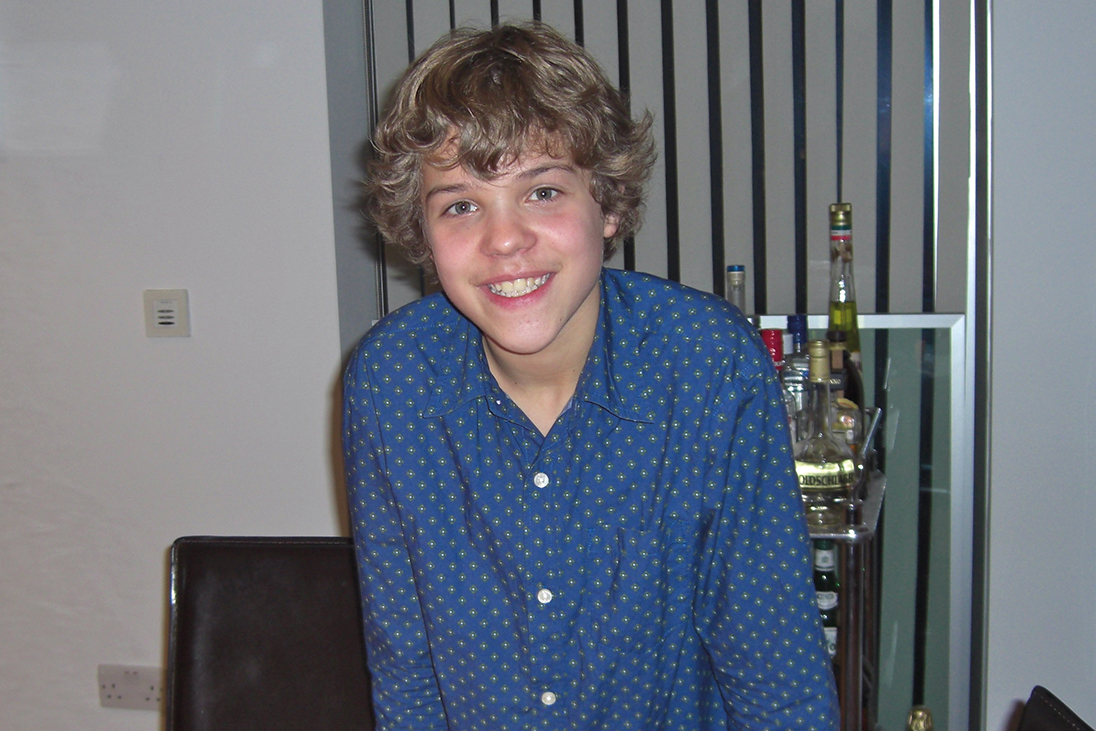Breck Bednar was an intelligent and handsome teenager who grew up in leafy, middle class Surrey suburbia. When he was a child, Breck’s hero was the TV character Bob the Builder, which was apt because he loved fixing things, and was a dab hand at putting together flat-pack furniture.
Breck loved science and technology, so it was inevitable that, by the age of 10, this chilled and likeable young boy found his escape in computing, building Minecraft worlds on his computer.
However, four years later, Breck was dead. He had been brutally murdered, after being lured to his death by someone he met online.
The tale is truly horrific.
And yet, as Breck’s mother, Lorin LaFave, tells the story, you can feel the raw emotion in her voice. There is even the occasional watery eye as she reflects: what more could I have done to have prevented my son’s death?
Some mothers would have become hermits by detaching themselves from the world following such an horrendous, life-changing moment. Not Lorin.
Originally from Pontiac in Michigan, on the outskirts of Detroit, this 51-year-old, who is also the mother of triplets, is made of stronger stuff.
Following the murder of Breck in 2014, Lorin, who is a member of Rotary Deal in Kent, set up the Breck Foundation whose aim is to educate children, parents, teachers, the police and others about online grooming.
And this March, schoolchildren across England will be watching a film called ‘Breck’s Last Game’ in planned classes which tells the shocking story.
This short film will be rolled out in schools in Surrey, Essex, Leicestershire and Northamptonshire, whose police forces are supporting the initiative.
Essex Police’s Assistant Chief Constable, Andy Prophet, said: “This is not an issue we can shy away from.
“Breck’s death shows us that that the consequences of grooming can be absolutely horrific.”
I went to see Breck’s tutor to express my concern about my son spending too much time being online with someone I didn’t know. She said Breck was getting good grades and don’t worry.”
Breck’s killer was an 18-year-old called Lewis Daynes.
He ran the online games room which Breck and his friends visited for hours on end. Daynes posed as the mysterious owner of a multi-million dollar software business based in New York.
In reality, he was an unemployed teenager from Grays in Essex who, in 2015, was sentenced to a minimum of 25 years in prison for killing Breck.
Lorin never once refers to Daynes by name during the interview.
She refers to him as The Predator throughout the narrative, describing the moment her first born ran home from school to tell his mum about the online gaming room his friends had invited him to, to receiving the awful, final phone call which no parent ever wishes to hear.
“I was pleased that Breck’s friends had invited him into their gaming room,” recalled Lorin, who worked as a teaching assistant.
“I knew the boys because I had taught them at primary school. I knew where they lived, I knew their parents, so I thought it would be a safe environment for him to spend time online.
“The friends would make plans during the day about what teams and squads they were going to join. Breck would come home, rush through his chores, eat his dinner and meet the guys online. He would go to his room, the door was open, he was laughing and joking, and nothing sounded dangerous.
“Then, I remember one day overhearing what sounded like a man’s voice. I stopped in my tracks, went to Breck’s room and asked: ‘Why are you speaking to a man, who is this?’
“Breck said: ‘It’s not a man, mum, it’s the guy who runs the server. The guys at school have been gaming with him for years. He is super clever, really great with technology, he’s teaching us to code and encrypt, and we are learning more from him than we are learning at school.’”
Lorin admitted that straight away she was concerned. Her antennae told her something was wrong. She checked The Predator for his online footprint, and although there was information on Facebook, LinkedIn and some games’ forums, there were no photographs.


Breck Bednar loved working on his laptop at home, spending hours online playing games
She asked her son why this was so, but Breck laughed it off reasoning it was because of The Predator’s undercover work in America.
“Every time I questioned Breck, he had what seemed like a sensible answer,” explained Lorin. “I would eavesdrop and go into Breck’s room to try to engage with the boys, but they didn’t want to talk to their old teacher.
“But The Predator would chat with me. He would say ‘Hey, what’s going on mum, what are you doing?’ and we would have proper conversations.
“I couldn’t see him, but I could hear him and I would ask things like ‘what are you doing in New York City?’, trying to get information. But he would never talk about New York.
“Funny things would pop up on the screen which we would all laugh at – comedy or music.
“If I had just come back from a dance class, dancing ladies would pop up. It was very engaging, this virtual club house, so I could understand why Breck would want to hang out there with his friends.”
But, in time, Lorin noticed how Breck’s personality was slowly changing.
He was getting stroppy, refusing to do chores around the house, and reluctant to go to church or take part in family activities.
Breck would tell his mother that The Predator had told him he was past all that. This was the summer of 2013, when the controlling started.
Lorin explained: “All of a sudden, I felt that everything that Breck was saying to me was coming from the mouth of a stranger online.
“It almost felt like there was another parent trying to parent Breck, telling me what to do with my child, in my own home, and it just didn’t feel right.”
Sadly coming from America I felt safer living in England because I am against guns and ironically my son gets stabbed.”
What ensued was a nightmare situation as Lorin found herself sliding down a vortex of despair, seemingly unable to help her son who was being drawn away from her by The Predator.
She feared Breck was being groomed for sex. Then she wondered if her son and the boys were being groomed for radicalisation or to hack into Government computers.
The problem was, wherever Lorin turned – to the school, to the other boys’ parents, friends and even the police – they were all initially dismissive, telling her not to worry, since it was normal for teenagers to spend hours online.
“The truth is, no matter what the grooming is for, the characteristics are all the same, no matter what the intended outcome is.
“There was the befriending, the gaining of trust, the building of that relationship through shared interest – their particular shared interest was computing and gaming.
“I felt that The Predator was isolating Breck from me, almost trying to take charge of him. He trying to parent Breck and telling Breck what I should be doing. It just didn’t feel safe.”
Lorin tried to limit her son’s screen time, unaware that The Predator had supplied three internet routers to Breck’s bedroom, so they could communicate anytime they wanted. He even secretly couriered a £600 iPhone to Breck.
She called an intervention meeting with Breck’s friends and their parents to put a brake on the online activity.
After some persuasion, the other boys agreed to leave the gaming room, unaware that The Predator had asked Breck to record the meeting so he knew exactly what was happening.
The Predator was running rings round Lorin, who was feeling helpless.
You never believe something like this is going to happen to anyone in your family. Breck was a clever and a good boy, yet he fell for the gradual tricks of the trade of a groomer.”
What hurts now is that if the red flags had been raised earlier, and interventions put in place, she believes Breck Bednar could have been saved.
It was later revealed during the police investigation that The Predator had a number of indecent images stored on his computer.
“I went to see Breck’s tutor to express my concern about my son spending too much time being online with someone I didn’t know. She said Breck was getting good grades and don’t worry.
“Someone could have recommended the Child Exploitation and Online Protection Command. They are part of the National Crime Agency, but no-one in the whole year that Breck was being groomed recommended them.
“They could have helped.”
And it is that ignorance which lies at the heart of the work of The Breck Foundation, which seeks to educate children from as young as four-years old about healthy relationships and digital resilience – being aware of the dangers of the internet, learning more about grooming and exploitation.
According to the National Crime Agency (NCA), there are up to 80,000 people in the UK who “present some kind of sexual threat” to children online.
Referrals of child abuse images to the NCA have increased by 700% over the last five years.
The story ends tragically on February 17th, 2014, poignantly the date of Lorin’s birthday. Breck was staying with his father in Caterham having just returned from a school trip to Spain.
Ironically, Lorin was spending her birthday in Spain teaching.
Breck asked his father if he could spend the day, and later the night, at the nearby home of one of his school friends.
The Predator had pre-booked a taxi which turned up at the family home in Surrey and made the hour-long drive to The Predator’s modest flat in Grays.
It was there that Breck was brutally murdered, and pictures of Breck’s bloodied body were sent to his online friends. The first the family learnt of his murder was when Lorin’s 12-year-old triplets received texts saying: ‘Sorry to hear about your brother RIP. Poor Breck, we’re going to miss him’.
“The next call I got was the worst call a parent can ever receive,” recalled Lorin.
“It was from my ex-husband who said: ‘I don’t know how to tell you this, but The Predator has murdered Breck’.
“At that point I couldn’t stop screaming. I damaged my ears. I was at a hotel where they had to get a doctor to sedate me. I just wanted to get home.”


Breck Bednar
Time has passed, but the pain never disappears. At times, Lorin admits she feels angry. How could an educated person like herself have been so easily duped and manipulated? She was aware Breck was being groomed, but she did not know how to fix the problem.
“Sadly, coming from America, I felt safer living in England because I am against guns, and ironically my son gets stabbed,” she added.
“You never believe something like this is going to happen to anyone in your family. Breck was a clever and a good boy, yet he fell for the gradual tricks of the trade of a groomer.”
Lorin and members of The Breck Foundation are now spreading the message of online resilience in talks across the country.
Rotary clubs in Deal and Caterham have got involved by helping to fund these talks and Lorin is hoping other clubs will join forces.
The students are presented with blue wrist bands carrying the Foundation’s web address and with the Rotary logo.
Lorin added: “Sometimes I tell myself that I am going to run into a cave and never come back out because I don’t want to do this forever, but I just know that if I had heard me speak when Breck was being groomed, he would be here now.
“If I had been in a training session in school, if I had seen me on the news or sat in a conference, my son would have been alive because I would have known what to do.”


























































